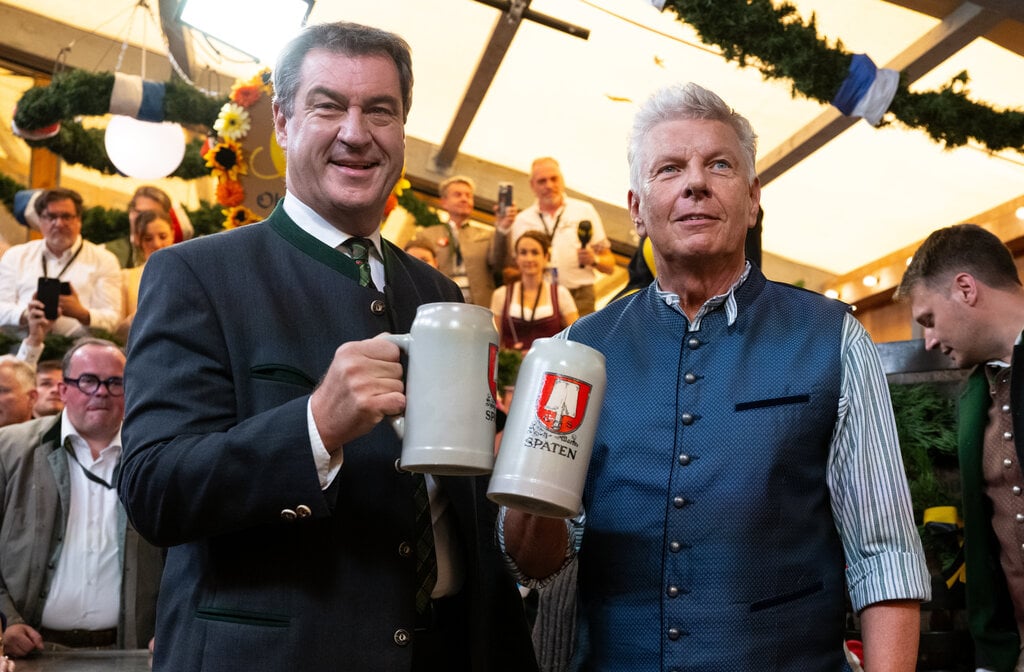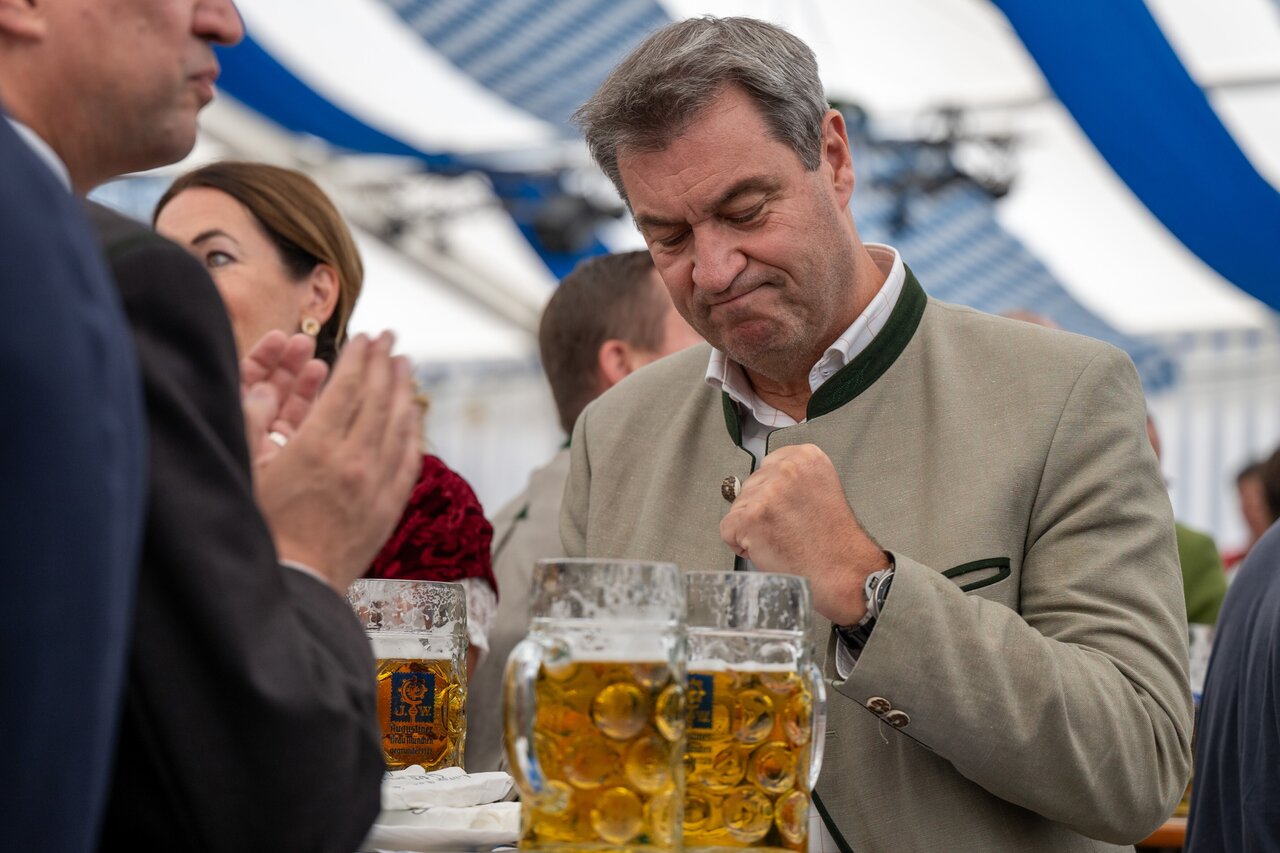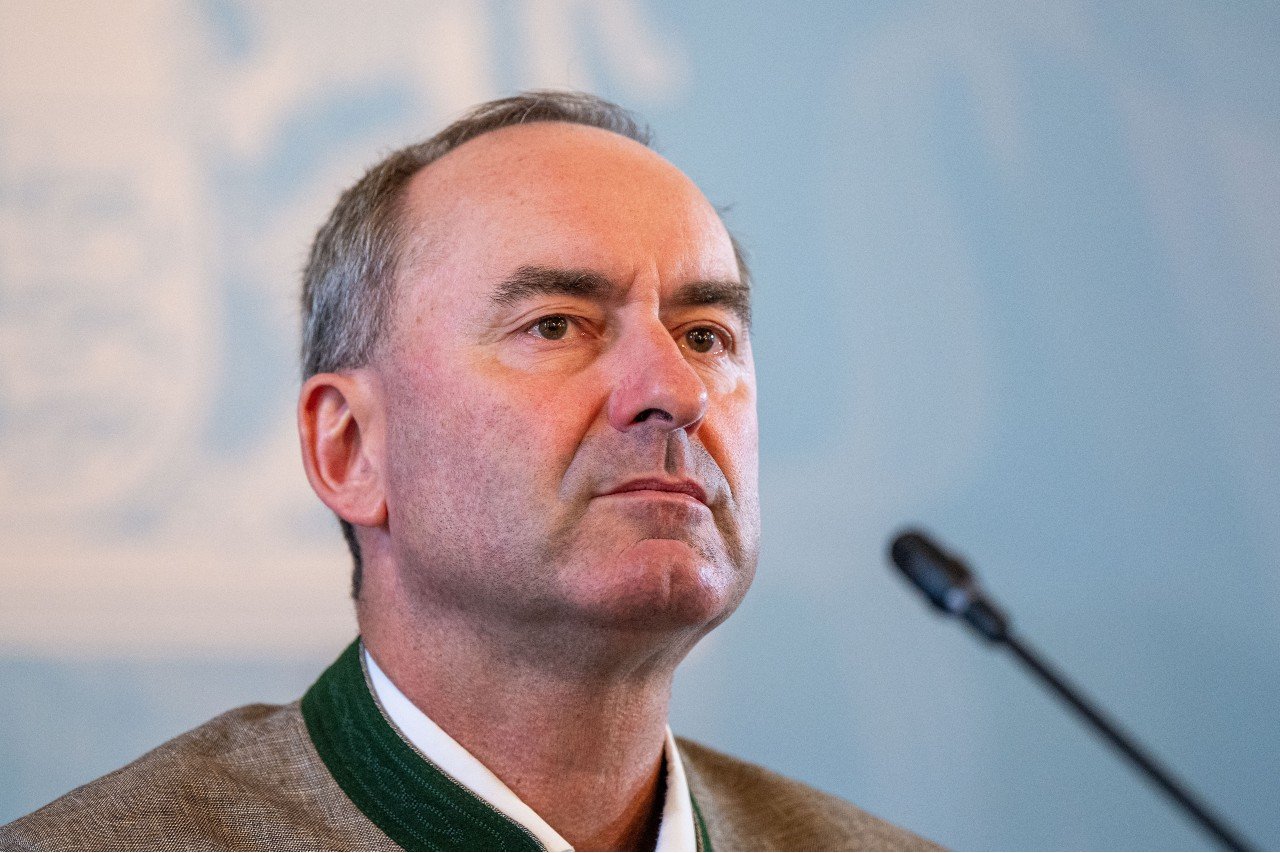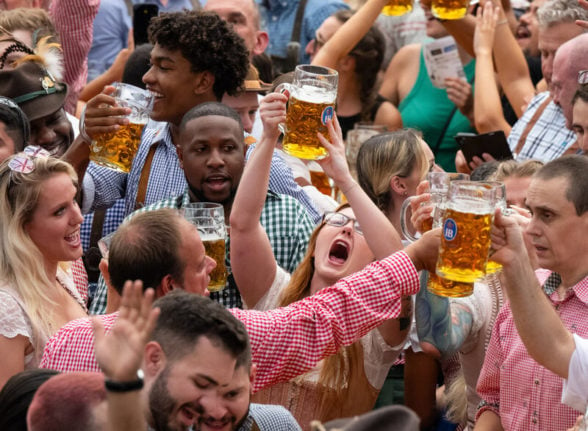After two years in which, for the first time since the Second World War, it was cancelled and a third in which many didn’t quite feel ready to go back, this year’s Oktoberfest is the first “normal” one since 2019. The Wiesn, which runs until October 3rd, is once again seeing packed-out tents full of party-goers, sun-dappled beer gardens bustling with all sorts, and dirndl-clad waitresses weaving their way through it all clutching tankards of beer.
And just like every year, Munich’s notoriously grumpy residents are complaining about how expensive things have got while laying down money hand over fist. That’s the way things have always been over the 15 years that I’ve been an Oktoberfest regular – and, I’m pleased to report, it’s the way they were when I was there last week.
READ ALSO: Everything you need to know about Germany’s Oktoberfest
Another thing people in Munich love to complain about as they drink away an afternoon: their politicians. And with the Bavarian state elections scheduled for the weekend after the Oktoberfest finishes, politics is especially topical this year.
Many in Munich are already steeling themselves for something of a double-whammy when, on Sunday, October 8th – still trying to shake their accumulated mega-hangover – a political headache hoves into view.
On current polling, the coalition of CSU and Freie Wähler should be able to press on for another five years, but with Markus Söder’s conservative CSU down from 37.2 percent to somewhere nearer the 30 percent mark and Hubert Aiwanger’s populist Freie Wähler up from 11.6 percent into the high teens.

On paper that’s not a particularly difficult situation, especially compared to neighbouring Thuringia, where a minority three-party coalition is having difficulties, and the opposition is under fire for pushing through laws with votes from the far-right. In practice, though, it’s less simple than that.
‘The way we were…’
And people in Munich are used to their politics being pretty straightforward. For decades, Bavaria was essentially a one-party state, with the CSU guaranteed to win. Between 1970 and 2003, the party took over 50 percent of the vote every single time – unimaginable in other parts of Germany long used to coalition government.
CDU-affiliated, yet staunchly independent, the CSU’s unique success was based on the broad-church conservatism of Germany’s Christian Democrats rendered specifically palatable to Bavarians – a people not exactly known for their lack of self-confidence – with a good dose of regional chauvinism and a pinch of outright populism.
READ ALSO: Why Bavaria does politics differently to the rest of Germany
The proposition was clear: strong state governments in Munich keep interference from far-away federal administrations at bay, so all true Bavarians – whether they actually like CSU policy or not – should vote CSU at state level.
Essentially, the CSU was the political translation of Mia sann mia, that dialectal dictum which literally means “We are us” – i.e. we are proud to be Bavarian, and by the mid-2000s, had become as used to winning as that other enduringly dominant force from down south, Bayern München.

In another parallel to the football team, the CSU was also utterly ruthless with losers. When they plunged from 60.7 percent in 2003 to 43.5 percent to 2008 and were left looking for a coalition partner for the first time since the mid-1960s, this was considered a shameful anomaly and grounds to fire the manager. Yet as it turned out, the drop below 50 percent wasn’t a blip, and no amount of sacking the coaches could change that.
After a brief upward tick in 2013, the 2018 ballot saw the CSU plumb unprecedented electoral depths under the 40 percent mark – and Markus Söder manage to stay in post.
READ ALSO: 7 things to know about the Bavaria 2018 election
Bavaria’s voters change behaviour
Since the alarm bells first started ringing in 2008, it’s become clear that the CSU’s Mia sann mia shtick is wearing thin. Bavaria’s electorate is proving ever less willing to sacrifice its political preferences on the altar of strong regional government, with urban high-earners turning to the FDP and rural voters switching in their droves to the AfD and the Freie Wähler.
And in a region where politics has always been done in beer halls and tents at boozy fairs – the Oktoberfest could be considered unusual for not having political rallies – populists draw frothy roars of delight when they spool off the usual list of demands: fewer foreigners, more nurses; banning gender-neutral language, etc.
While the AfD hoovers up the genuine xenophobes (of which rural areas have no shortage), ‘the Free Voters’, as they’re called, pretend that they’re not a political party, having correctly perceived that many distrust even the very idea of political formations these days, selling themselves instead as the ‘voice of the silent majority’ to protest voters.
After these two outfits first entered the Bavarian Parliament in 2008, the CSU response was been to fight fire with fire and populism with populism. Yet the CSU is now learning what many middle-of-the-road conservative parties elsewhere have already found out: the right-wing end of their vote has become more radical of late, and the traditional conservative strategy of chucking it the odd scrap of red meat and then governing sensibly just gives it an appetite for more red meat.
What is more, the Freie Wähler’s leader Hubert Aiwanger has got a whole Bavarian butcher’s shop of the stuff, saying whatever he thinks will strike a chord with the disappointed and dissatisfied, deftly appealing to a peculiarly Bavarian sense of having been slighted (they never got over being ruled from Berlin) and turning protest voting into permanent voter migration.

With his constant complaints that ordinary, right-thinking Bavarians are not being listened to, he has hit on a political M. O. which has made him unstoppable. So much so that, when it was recently revealed that he had, as a schoolboy, been in possession of flyer filled with hate-speech and offering (loose translation:) ‘traitors of the fatherland a free trip through the chimney stacks at Auschwitz’, he even managed to turn that to his advantage, issuing a mealy-mouthed apology while claiming that it had all been a media campaign to shut him up in the run-up to the election…
READ ALSO:
- Why a high profile Bavarian politician is embroiled in an anti-Semitic row
- Bavarian deputy PM to stay on despite anti-Semitism scandal
Different Oktoberfest chit chat
Hence the upcoming political headache. In Munich, structurally less conservative than rural Bavaria, Aiwanger is viewed by many with suspicion, even fear. Campaign posters with his face are defaced with Hitler ‘taches and zombie-lobotomy forehead scars.
Yet Markus Söder cannot risk an open break with him for fear of making him a martyr elsewhere, especially given that both the Greens and the FDP, Söder’s other potential coalition partners, are in the electoral doldrums now that the federal ‘traffic-light coalition’, as it is known, has turned sour – and in no mood to help the CSU, under whose dominance they have suffered for so long.
Meanwhile, expectations in the once-dominant formation are now so low that Söder would probably have to get a result south of 30 percent to be at risk of being deposed.
So everything points towards an uneasy continuation of the status quo: a weakened CSU in hock to a populist protest movement. Alternatively, they might be able to try for a “Jamaica” coalition if both the Greens and FDP scrape back in over the 5 percent hurdle, but it would be a steep hill to climb. Whatever happens, Söder – once seen as a strongman, now pitied – will most likely keep limping on.
30 percent as the new 50 percent? Tripartite coalition options? Unsuccessful leaders being allow to stay put?
This isn’t the kind of Oktoberfest talk that Munich is used to. So in that one sense, this year’s Wiesn did actually feel very different to many of yesteryear. By next year, though, it’ll probably be completely normal.




 Please whitelist us to continue reading.
Please whitelist us to continue reading.
Excellent insights and a fascinating, superbly-written distillation of Bavaria’s current political morass – thanks for this!
Thank *you* for reading and commenting, Daniel. Always happy to be of service!